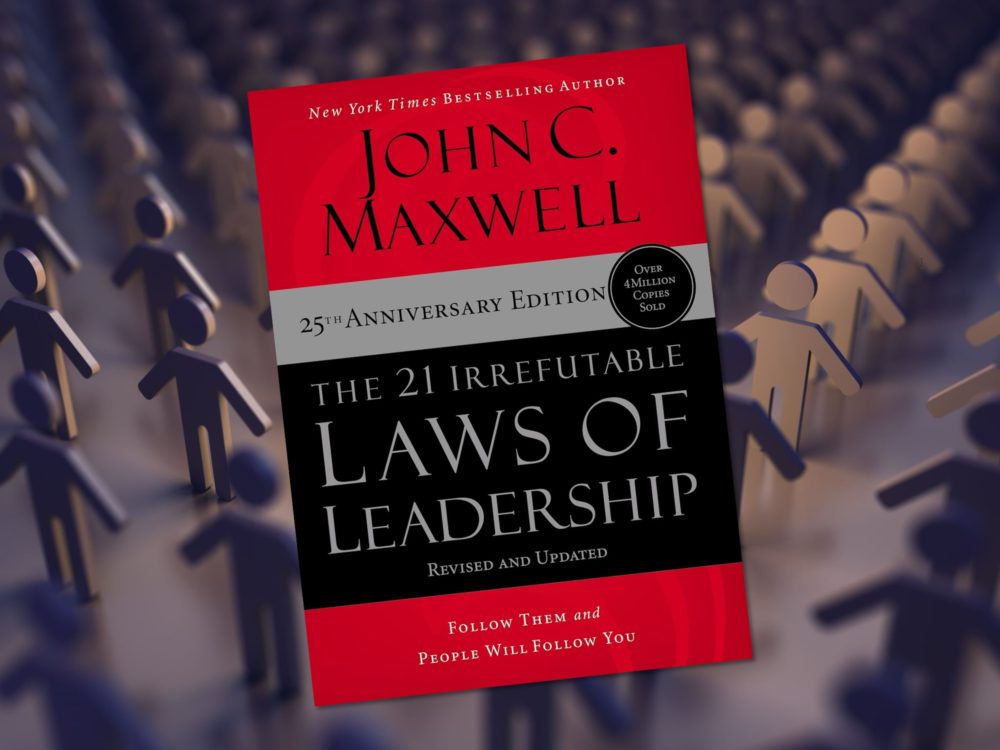Overview
“The 21 Irrefutable Laws of Leadership: Follow Them and People Will Follow You” from John C. Maxwell distills the essence of leadership into twenty-one fundamental principles that are timeless and universal. Maxwell, an internationally recognised leadership expert, draws from his extensive experience and knowledge to present these laws as truths that hold regardless of one’s awareness or acknowledgment of them.
The subtitle “Follow Them and People Will Follow You” encapsulates the core message of the book, emphasising that leadership is fundamentally about influence rather than authority or position. Maxwell asserts that by understanding and applying these laws, leaders can elevate their ability to inspire and attract followers. Each chapter ends with practical advice on how to implement the law in question, making the book not only a source of inspiration but also a practical guide for anyone looking to enhance their leadership skills and expand their influence.
Synopsis
The book is structured to provide a definition for each law, supported by historical examples and personal anecdotes, illustrating the profound impact these laws have on the effectiveness and success of a leader. The twenty-one “laws” described in the book can be summarised as follows:
- The Law of the Lid:
Leadership ability is the cap that determines a person’s potential for effectiveness. - The Law of Influence:
Leadership is not about titles or positions but about one’s influence on others. - The Law of Process:
Leadership skills are cultivated daily, not acquired in an instant. - The Law of Navigation:
While many can manage a task, true leaders strategically map out the path to success. - The Law of Addition:
True leaders serve their teams and, by doing so, increase their value. - The Law of Solid Ground:
Leadership is built on a foundation of trust, without which it cannot stand. - The Law of Respect:
Individuals naturally gravitate towards and follow leaders who are perceived as stronger. - The Law of Intuition:
Leaders have a keen sense for business and people, often trusting their gut. - The Law of Magnetism:
Leaders attract individuals similar to themselves in character and skill. - The Law of Connection:
Leaders must first connect emotionally before asking for commitment. - The Law of the Inner Circle:
A leader’s potential is greatly influenced by those they choose to surround themselves with. - The Law of Empowerment:
Confident leaders are not threatened by empowering others. - The Law of the Picture:
People will emulate what they observe in their leaders. - The Law of Buy-in:
People are inspired to follow a leader first, then the vision the leader espouses. - The Law of Victory:
Effective leaders are relentless in seeking ways for the team to achieve victory. - The Law of the Big Mo:
Momentum is a force that, once created, makes a leader’s job much easier. - The Law of Priorities:
Leaders recognise that being busy doesn’t always equate to being productive. - The Law of Sacrifice:
Leadership often requires giving up personal gain for the benefit of the team. - The Law of Timing:
Successful leadership depends on making the right move at the right time. - The Law of Explosive Growth:
To truly scale, leaders must develop other leaders, not just followers. - The Law of Legacy:
A leader’s true worth is determined by the succession they leave behind.
Is it worth reading it?
The book may not break new ground in the field of leadership theory, but it does serve as a comprehensive compendium of leadership principles that have stood the test of time. The book’s strength lies in its ability to distill complex leadership concepts into clear, actionable laws that can be applied across a variety of situations. Maxwell’s presentation of these ideas is both engaging and accessible, making it a valuable resource for those new to leadership or in need of a refresher.
For seasoned professionals well-versed in management literature, the book might echo familiar themes, yet its value comes from the consolidation of these principles into a coherent framework. The book’s format allows for easy reference and reflection, and Maxwell’s reputation as a leadership authority lends weight to his insights.
In summary, the book is worth reading for its succinct and motivational overview of leadership essentials, even if it doesn’t offer groundbreaking new strategies.
Critics and review
The book has sparked lot of reviews suggesting it resonates with many. The book’s straightforward presentation of leadership principles provides a clear framework for those seeking to enhance their influence and leadership skills. Maxwell’s engaging storytelling and practical insights have inspired readers to apply these laws in various aspects of their lives, often leading to significant personal and professional growth.
However, some critics have noted that the book’s approach, while well-intentioned, may come across as overly prescriptive and lacking in the nuanced understanding of the complex nature of leadership. The content, perceived by some as repetitive, may not offer groundbreaking insights for those well-versed in leadership literature. Despite these critiques, the book’s ability to compile and articulate time-tested leadership principles in an accessible manner makes it a valuable read for a wide audience.
Verdict
In summary, the book’s attempt to simplify leadership into definitive laws is both its strength and its weakness; it provides a digestible guide for aspiring leaders but risks oversimplification of a complex subject. The book’s merit lies in its ability to provoke thought and discussion about leadership, even if its style and substance may not resonate with everyone.
About the author
John C. Maxwell is a prolific author and an influential figure in the fields of leadership and personal development. With a career that spans several decades, Maxwell has authored over 70 books, which have sold millions of copies worldwide and have been translated into fifty languages. His extensive bibliography includes titles that have become mainstays in management literature and are considered essential reading for those interested in leadership.
Maxwell’s background as a pastor contributes to his empathetic approach to leadership, which resonates throughout his works. He is also a sought-after speaker and the founder of organisations like EQUIP, which reflects his commitment to developing leaders. His books, such as “The 21 Irrefutable Laws of Leadership,” have cemented his reputation as a leadership authority, earning him accolades and a dedicated following among business professionals and aspiring leaders.













